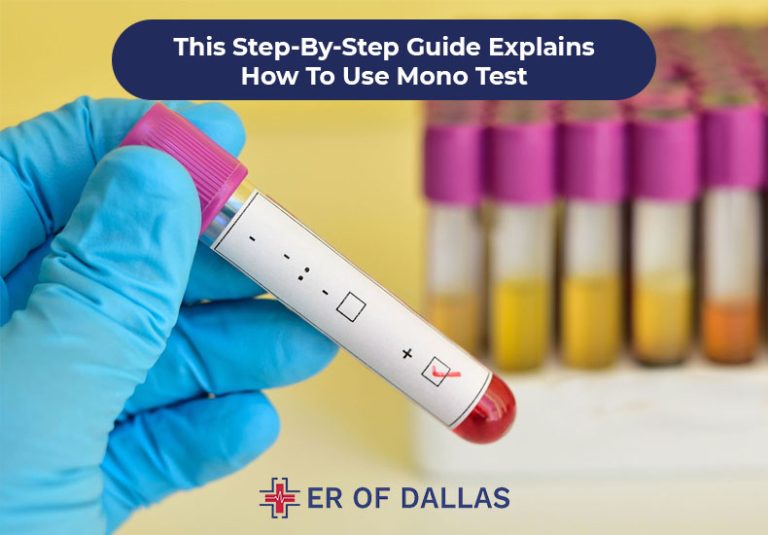Introduction
If you’re feeling fatigued, experiencing a sore throat, or dealing with swollen glands, you might be wondering, where can I get a mono test? Infectious mononucleosis (commonly known as mono) is a viral illness caused by the Epstein-Barr virus (EBV). It’s often referred to as the “kissing disease” because it spreads through saliva, but it can also spread through coughing, sneezing, and sharing drinks.
Knowing where to get tested and how the process works is essential for early detection and effective treatment. This guide will cover everything you need to know about mono tests, where to get them, what they cost, and why timely testing matters.
What is a Mono Test?
A mono test is a blood test that detects heterophile antibodies produced during an Epstein-Barr virus infection. The most common mono test is the Monospot test, which checks for these antibodies.
Why is Mono Testing Important?
Accurate Diagnosis: Symptoms of mono resemble those of flu, strep throat, or COVID-19.
Prevents Complications: Untreated mono can lead to an enlarged spleen or liver issues.
Quick Relief: Early diagnosis means quicker symptom management and recovery.
Symptoms That Indicate You May Need a Mono Test
Before you rush to the nearest clinic, check if you have these symptoms:
Persistent fatigue lasting over a week
Severe sore throat and swollen tonsils
Swollen lymph nodes in the neck and armpits
Fever and chills
Enlarged spleen or liver pain
Headaches and body aches
Where Can I Get a Mono Test? (Top Options)
Finding the right place to get tested is crucial for convenience, accuracy, and cost-effectiveness. Here are your best options:
1. Emergency Rooms (ER) – ER OF DALLAS
If you have severe symptoms or complications like extreme fatigue, dehydration, or abdominal pain (possible spleen enlargement), ER OF DALLAS is an excellent option. They offer:
24/7 Testing Availability
On-site Rapid Mono Test for quick results
Comprehensive Care if complications arise
Why Choose ER OF DALLAS?
No long wait times
Board-certified emergency physicians
Advanced diagnostic tools for accurate testing
2. Urgent Care Centers
Urgent care clinics are convenient for mild to moderate symptoms. Many centers provide:
Same-Day Mono Testing
Affordable Pricing compared to ER
Shorter Wait Times than most hospitals
3. Primary Care Physician’s Office
If you have a family doctor, this is a good first step. They can:
Perform the mono test
Review your complete medical history
Recommend rest or refer you to a specialist if needed
4. Walk-In Clinics & Retail Clinics
Pharmacy-based clinics (like CVS or Walgreens) often offer mono testing without an appointment.
Pros: Quick and easy
Cons: Limited treatment options if complications are found
5. Diagnostic Laboratories
Labs like LabCorp or Quest Diagnostics allow you to order tests online and visit a local lab for blood collection.
Usually requires a doctor’s order
Results take 24–48 hours
Cost of Mono Test
The cost depends on where you go:
Emergency Room: $100–$250 (plus facility fees)
Urgent Care: $50–$150
Primary Care: $30–$100 with insurance
Walk-in Clinics: $40–$80
Labs: $30–$70 for self-pay
What to Expect During a Mono Test
Blood Draw: A small blood sample is taken from your arm.
Lab Testing: The Monospot test checks for EBV antibodies.
Result Time:
Rapid test: Within minutes to an hour
Lab test: 24–48 hours
What If the Mono Test is Positive?
There’s no cure for mono, but treatment focuses on symptom relief:
Rest and Hydration
Fever Reducers and Pain Relievers
Avoid Sports or Heavy Lifting (to prevent spleen rupture)
Follow-up Visits for liver and spleen check-ups
How ER OF DALLAS Helps with Mono Testing
At ER OF DALLAS, patients get:
Immediate Testing & Results
Comprehensive Emergency Care
IV Fluids & Medications if symptoms are severe
Personalized Treatment Plans
Location Advantage: Conveniently located in Dallas, TX, providing 24-hour emergency care.
Tips for Preventing Mono
Avoid sharing drinks or utensils
Practice good hygiene (handwashing)
Limit close contact with infected individuals
Frequently Asked Questions (FAQs)
1. How long does a mono test take?
Rapid tests can give results in less than an hour. Lab tests may take 1–2 days.
2. Can mono be treated with antibiotics?
No, antibiotics don’t work for viral infections like mono.
3. Is mono contagious?
Yes, it spreads through saliva and close contact.
4. Do I need to visit an ER for mono?
If you have severe symptoms like extreme fatigue, high fever, or abdominal pain, yes. ER OF DALLAS is available 24/7 for emergencies.
5. Can I return to school or work with mono?
Only after your fever subsides and fatigue improves—usually after 2–4 weeks.
Conclusion
Mono can be uncomfortable, but getting tested early ensures proper care and recovery. From ERs like ER OF DALLAS to urgent care centers and labs, there are many places where you can get a mono test. Choose the option that fits your symptoms and needs best.
For more information visit
https://erofdallastx.com/blog/how-to-use-mono-test-guide/Introduction
If you’re feeling fatigued, experiencing a sore throat, or dealing with swollen glands, you might be wondering, where can I get a mono test? Infectious mononucleosis (commonly known as mono) is a viral illness caused by the Epstein-Barr virus (EBV). It’s often referred to as the “kissing disease” because it spreads through saliva, but it can also spread through coughing, sneezing, and sharing drinks.
Knowing where to get tested and how the process works is essential for early detection and effective treatment. This guide will cover everything you need to know about mono tests, where to get them, what they cost, and why timely testing matters.
What is a Mono Test?
A mono test is a blood test that detects heterophile antibodies produced during an Epstein-Barr virus infection. The most common mono test is the Monospot test, which checks for these antibodies.
Why is Mono Testing Important?
Accurate Diagnosis: Symptoms of mono resemble those of flu, strep throat, or COVID-19.
Prevents Complications: Untreated mono can lead to an enlarged spleen or liver issues.
Quick Relief: Early diagnosis means quicker symptom management and recovery.
Symptoms That Indicate You May Need a Mono Test
Before you rush to the nearest clinic, check if you have these symptoms:
Persistent fatigue lasting over a week
Severe sore throat and swollen tonsils
Swollen lymph nodes in the neck and armpits
Fever and chills
Enlarged spleen or liver pain
Headaches and body aches
Where Can I Get a Mono Test? (Top Options)
Finding the right place to get tested is crucial for convenience, accuracy, and cost-effectiveness. Here are your best options:
1. Emergency Rooms (ER) – ER OF DALLAS
If you have severe symptoms or complications like extreme fatigue, dehydration, or abdominal pain (possible spleen enlargement), ER OF DALLAS is an excellent option. They offer:
24/7 Testing Availability
On-site Rapid Mono Test for quick results
Comprehensive Care if complications arise
Why Choose ER OF DALLAS?
No long wait times
Board-certified emergency physicians
Advanced diagnostic tools for accurate testing
2. Urgent Care Centers
Urgent care clinics are convenient for mild to moderate symptoms. Many centers provide:
Same-Day Mono Testing
Affordable Pricing compared to ER
Shorter Wait Times than most hospitals
3. Primary Care Physician’s Office
If you have a family doctor, this is a good first step. They can:
Perform the mono test
Review your complete medical history
Recommend rest or refer you to a specialist if needed
4. Walk-In Clinics & Retail Clinics
Pharmacy-based clinics (like CVS or Walgreens) often offer mono testing without an appointment.
Pros: Quick and easy
Cons: Limited treatment options if complications are found
5. Diagnostic Laboratories
Labs like LabCorp or Quest Diagnostics allow you to order tests online and visit a local lab for blood collection.
Usually requires a doctor’s order
Results take 24–48 hours
Cost of Mono Test
The cost depends on where you go:
Emergency Room: $100–$250 (plus facility fees)
Urgent Care: $50–$150
Primary Care: $30–$100 with insurance
Walk-in Clinics: $40–$80
Labs: $30–$70 for self-pay
What to Expect During a Mono Test
Blood Draw: A small blood sample is taken from your arm.
Lab Testing: The Monospot test checks for EBV antibodies.
Result Time:
Rapid test: Within minutes to an hour
Lab test: 24–48 hours
What If the Mono Test is Positive?
There’s no cure for mono, but treatment focuses on symptom relief:
Rest and Hydration
Fever Reducers and Pain Relievers
Avoid Sports or Heavy Lifting (to prevent spleen rupture)
Follow-up Visits for liver and spleen check-ups
How ER OF DALLAS Helps with Mono Testing
At ER OF DALLAS, patients get:
Immediate Testing & Results
Comprehensive Emergency Care
IV Fluids & Medications if symptoms are severe
Personalized Treatment Plans
Location Advantage: Conveniently located in Dallas, TX, providing 24-hour emergency care.
Tips for Preventing Mono
Avoid sharing drinks or utensils
Practice good hygiene (handwashing)
Limit close contact with infected individuals
Frequently Asked Questions (FAQs)
1. How long does a mono test take?
Rapid tests can give results in less than an hour. Lab tests may take 1–2 days.
2. Can mono be treated with antibiotics?
No, antibiotics don’t work for viral infections like mono.
3. Is mono contagious?
Yes, it spreads through saliva and close contact.
4. Do I need to visit an ER for mono?
If you have severe symptoms like extreme fatigue, high fever, or abdominal pain, yes. ER OF DALLAS is available 24/7 for emergencies.
5. Can I return to school or work with mono?
Only after your fever subsides and fatigue improves—usually after 2–4 weeks.
Conclusion
Mono can be uncomfortable, but getting tested early ensures proper care and recovery. From ERs like ER OF DALLAS to urgent care centers and labs, there are many places where you can get a mono test. Choose the option that fits your symptoms and needs best.
For more information visit https://erofdallastx.com/blog/how-to-use-mono-test-guide/









